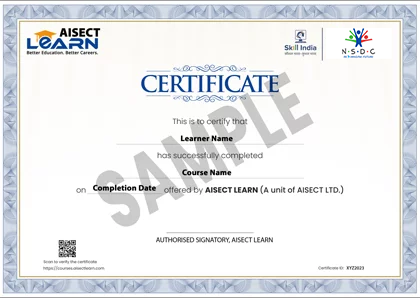Certificate Course in Vertical Farming
Self-Paced
Fee: ₹1,999
 Mr. Vikas Singh Thakur | Assistant Professor
Mr. Vikas Singh Thakur | Assistant Professor
Vertical farming revolutionizes agriculture by stacking layers of crops vertically, optimizing space and resources. Utilizing techniques like hydroponics and controlled environments minimizes water usage and maximizes yield. This sustainable approach, integrating technology and eco-friendly practices, promises a greener and more efficient future for global food production.
Objectives
What Will You Learn
Skills you will gain
Curriculum
-
Paper - 1 Vertical Farming
-
Chapter 1 - Introduction
-
Chapter 2 - Nutrient Supply
-
Chapter 3 - Air Conditioning/Atmosphere Energy Supply
-
Chapter 4 - Advantages and Disadvantages of a Vertical Farm
-
-
Paper - 2 Aquaponics
-
Chapter 1 - Introduction
-
Chapter 2 - Aquaponics Fish and Plants
-
Chapter 3 - Aquaponics Methods
-
Chapter 4 - Basic Parts and Supplies
-
-
Paper - 3 Aeroponic/Hydroponic
-
Chapter 1 - Introduction Aeroponic/Hydroponic
-
Chapter 2 - Advantages and Disadvantages of Aeroponics
-
Chapter 3 - Advantages and Disadvantages of Hydroponics
-
Chapter 4 - Other Systems/Functions
-
Chapter 5 - Role of pH in Plant Growth
-
Instructor

Mr. Vikas Singh Thakur
Assistant ProfessorMr. Vikas Singh Thakur is Assistant Professor at Rabindranath Tagore University in Bhopal (M.P.). He is actively engaged in teaching at UG and PG level. He received M.Sc. (Ag.) in Agricultural (Agricultural Biotechnology) from Mahatma Gandhi chitrakoot Gramodaya Vishwavidyalaya (MGCGV), chitrakoot, Satna (M.P.).The author has actively participated in many national and international conferences, published many research paper. The author has a good understanding of Vertical Farming
Still have queries? Talk to our counselors who are available to guide you.
Shareable Certificate

Other Details
Certificate Course in Verticle Farming
 Credentials
Credentials Associated Courses
 Instructor:
Instructor:
 Duration:
Duration:
 Course Credit:
Course Credit:
 Certification Body:
Certification Body:
 Language:
Language:
 Access:
Access:
 Shareable Certificate:
Shareable Certificate:

